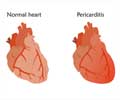Heart Attack Risk Factors-Stress and Heart Attacks
Many of us don't realize that certain food items we regularly take contain substances that may trigger dietary
Ken Lay, Enron founder, died of a
In a lay person’s usage “stress” commonly refers to the human condition arising from difficulties, problems, physical or emotional challenges-in short, the reactions and responses of human beings as they adapt themselves to the demands of day to day living.
Common sources of stress called “stressors” include a whole gamut of experiences beginning with the sensory input like very loud sound, bright light, and pain to environmental factors such as lack of control over basic needs such as food, shelter, health, freedom and mobility.
Social issues such as confronting a difficult individual, relationship conflicts, major events like birth, death, marriage, issues such as infidelity or a break–up, can cause a person to feel stressed.

Poverty, unemployment, disease, failure,
Hans Selye, a Canadian endocrinologist coined the term stress while explaining his biological stress theory - General Adaptation Syndrome (GAS) following his experiment exposing lab animals to unpleasant or harmful stimuli. He observed a set of similar reactions in 3 stages, which he concluded were a universal response to stressors.
In the first Alarm stage, the body that is in a state of
It is generally believed a heart-healthy lifestyle most definitely includes a stress-free life. Only recently has scientific evidence shown that poor management of acute stress causes
That a major number of heart attacks occur between 8am and 9am on a Monday morning (in places where the work week begins on Monday) is not just an urban myth concocted to drive home a point on reducing stress.
Stress is not entirely bad. Stress management is important-not stress elimination. Appropriate stress response is in a way healthy and a necessary aspect of life. For example, an appropriate stress response releases norepinephrine, which is one of the main excitatory neurotransmitters needed to create fresh memories. It is a natural mood enhancer, making problems feel like challenges, thereby encouraging creative thinking.
Yoga, meditation, listening to soothing music, taking time from work to visit new places of interest, going for spiritual retreats and exploring the inner self can help acquire knowledge of techniques that can activate one’s relaxation response to counter stress.
Ohio State University researchers observed that some kinds of stress are actually beneficial. While performing a memory task such as wracking one’s brains to solve a crossword puzzle activated the immune system, even passively watching a violent video weakened immunity (the researchers measured immunity by salivary concentration of SlgA, which is a major immune factor). Analyzing the results the researchers suggested that deadlines and other challenges at work, though annoying sometimes could actually help strengthen the body’s defenses.
Many of us don’t realize that certain food items that we regularly take contain substances that may trigger dietary stress. For example:
- Caffeine is a stimulant that can mimic the high effects of adrenaline
- A high sugar intake may aggravate stress and also lead to diabetes
- Excessive fasting and dieting can cause dietary stress
The body’s hormonal system faces extra pressure to retain the body fuel levels in the absence of adequate food intake
Health experts agree that B vitamins are important for the nervous system to function normally. A balanced diet should provide enough of B vitamins without needing supplements.
























